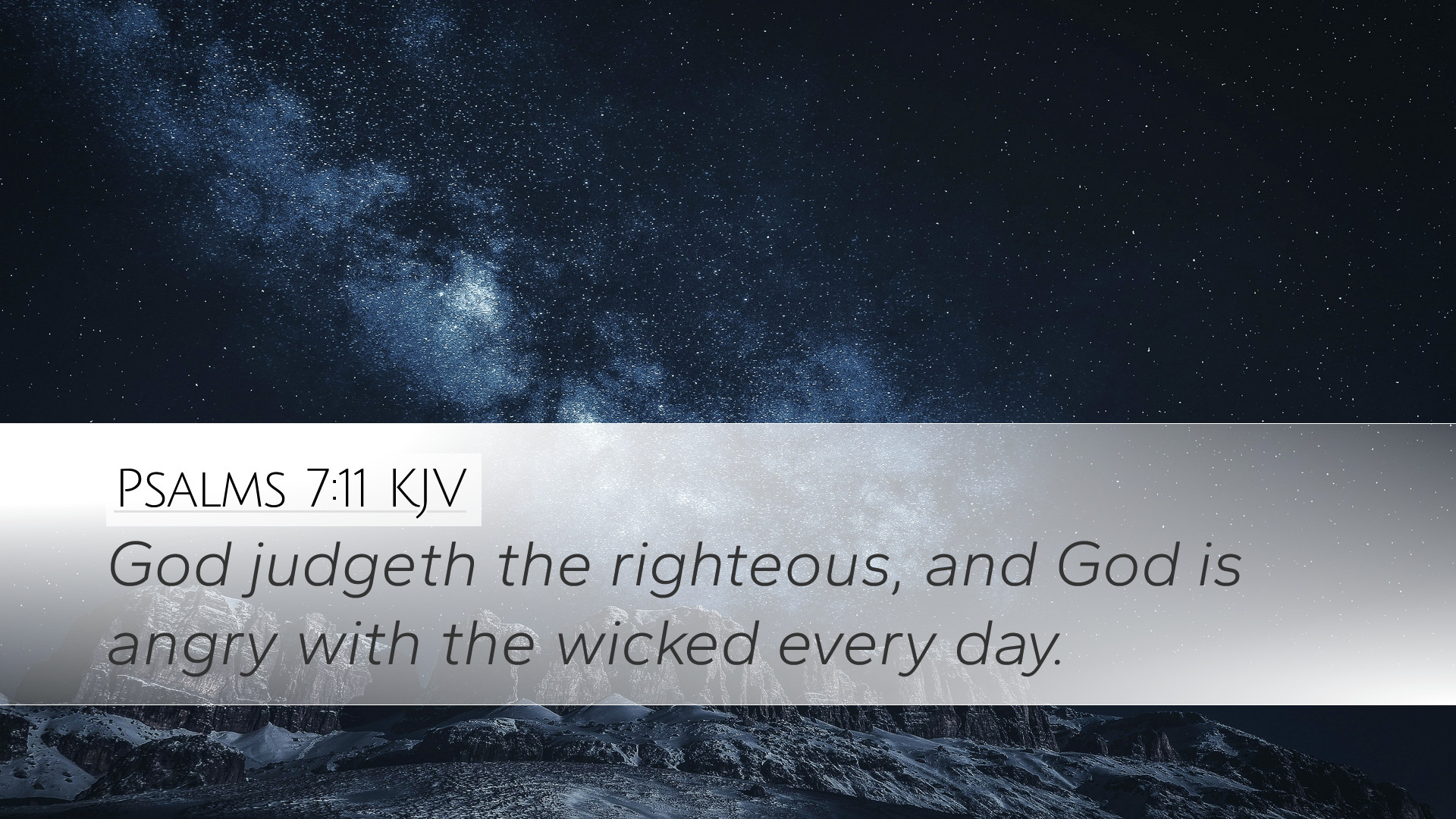Commentary on Psalms 7:11
Psalms 7:11 reads:
"God judgeth the righteous, and God is angry with the wicked every day." (KJV)
Overview
This powerful verse encapsulates the dual nature of God's character as both righteous judge and sovereign authority. It serves as a reminder of the constant state of God's judgment and the urgency with which He addresses injustice and wickedness in the world.
Insights from Matthew Henry
Matthew Henry highlights that this verse presents God as a just judge who is always vigilant. His anger towards the wicked is not arbitrary but rather a reflection of His holiness. Henry notes:
- God's Righteousness: The verse emphasizes that God’s judgments are aligned with His righteousness, and He rewards the righteous while punishing the wicked.
- God's Daily Anger: Henry remarks that God's anger against the wicked is a continual reality, indicating the pervasive nature of sin and its consequences.
He further explains that the wicked are not only held accountable for their deeds but also that their ongoing rebellion against God's law incurs His daily wrath.
Insights from Albert Barnes
Albert Barnes offers a theological reflection on God's judicial nature in this verse:
- God as Judge: Barnes asserts that God’s role as judge underscores His authority over all creation, asserting that He actively engages with human affairs.
- Implications of God's Anger: He elucidates that the phrase "angry with the wicked every day" conveys God's constant disapproval of sinful conduct, which is indicative of His unchanging nature towards sin.
- Encouragement for the Righteous: The righteous can find comfort in knowing that their integrity will be acknowledged and fortified under God’s eternal righteousness.
Barnes emphasizes that the crux of this verse is the assurance that while God is angry at sin, He provides a path for redemption to those who turn away from wickedness.
Insights from Adam Clarke
Adam Clarke provides a comprehensive exploration of the implications of the verse:
- God's Just Nature: Clarke argues that God’s judgment reflects His unerring justice and character. He is not capricious but rather acts according to His moral order.
- God’s Long-suffering: He highlights the notion of God being slow to anger, yet Clarke emphasizes that this patience should not be misinterpreted as indifference to sin, rather it is an opportunity for repentance.
- Consequences of Wickedness: Clarke cautions that the ongoing rebellion against God's laws leads to serious spiritual and moral consequences, highlighting the need for vigilance among believers.
Clarke's interpretation encourages believers to align with God’s righteousness, thereby escaping the due consequences of sin.
Theological Implications
This verse prompts significant theological discourse regarding the nature of God:
- God's Justice and Mercy: Discussions arise on the balance of God’s justice and mercy. While He is angry at wickedness, His overarching plan also includes grace through repentance.
- Human Responsibility: The verse prompts an examination of human accountability before God. It stresses that individuals are responsible for their choices and actions.
- The Nature of Sin: The concept of daily sin and its implications for believers becomes crucial in understanding the nature of human depravity.
Practical Applications
For pastors, theologians, and scholars, this verse should lead to practical applications in ministry and personal faith:
- Encouragement to Pursue Righteousness: The faithful are encouraged to pursue righteousness actively, knowing that God recognizes and upholds integrity.
- Discipleship and Teaching: Teaching congregations about the reality of God’s judgment can inspire deeper commitment to holy living.
- Call to Repentance: This verse serves as a clarion call for self-examination and repentance, both personally and within the community of believers.
Conclusion
Psalms 7:11 serves as a profound reminder of God's inherent nature as a righteous judge and His righteous indignation towards sin. Through the insights of notable commentators, we are afforded a richer understanding of God's character, the gravity of sin, and the urgency for a life marked by righteousness. It calls for a balanced view of fear, reverence, and love towards God, motivating believers to live in alignment with His moral order.


